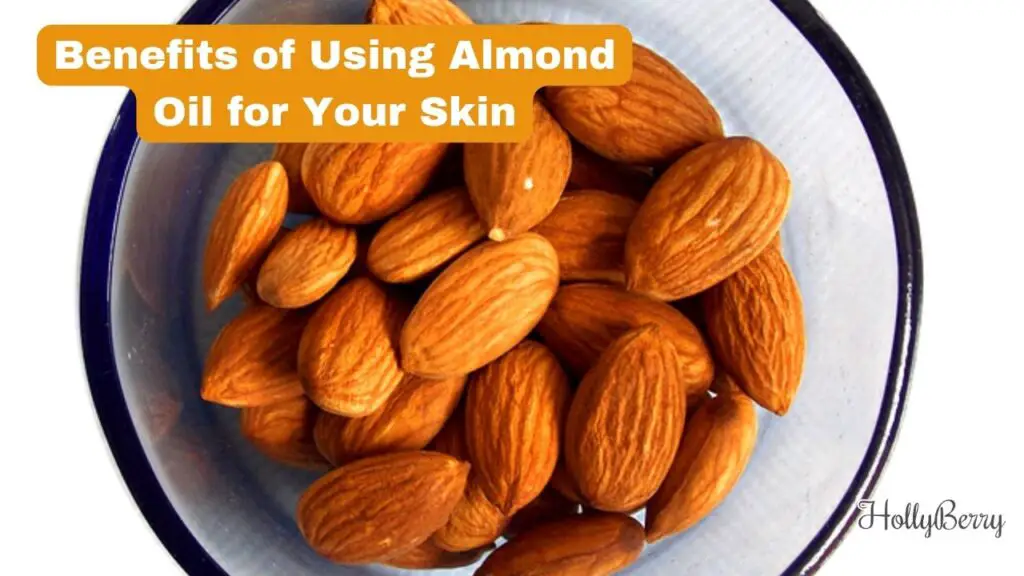
If you’re looking for a natural, gentle way to care for your skin, almond oil may be worth considering. This versatile oil has been used for centuries in traditional medicine and skincare practices, and for good reason.
Almond oil is rich in nutrients, antioxidants, and fatty acids that can benefit your skin in a number of ways.
One of the key benefits of almond oil is its ability to moisturize and nourish the skin. Its emollient properties make it an excellent choice for dry, flaky, or irritated skin. Almond oil is easily absorbed by the skin, leaving it feeling soft, smooth, and hydrated.
But that’s not all. Almond oil has also been shown to have anti-inflammatory and antimicrobial properties, which can help soothe and protect the skin.
Some studies suggest that it may even help reduce the signs of aging and improve the appearance of fine lines and wrinkles. Keep reading to learn more about the benefits of almond oil for your skin.
Benefits of Almond Oil for Skin
If you’re looking for a natural way to improve your skin’s health, almond oil could be a great option. Here are some of the benefits that almond oil can offer:
- Hydrates and moisturizes: Almond oil is rich in fatty acids and vitamin E, which can help to keep your skin hydrated and moisturized. This can be especially beneficial if you have dry or flaky skin.
- Reduces inflammation: Almond oil contains anti-inflammatory properties that can help to reduce inflammation and redness in the skin. This can be helpful if you have acne, eczema, or other skin conditions.
- Improves complexion: Regular use of almond oil on your skin can help to improve your complexion and give you a more radiant glow. It can also help to reduce the appearance of fine lines and wrinkles.
- Protects against sun damage: Almond oil contains natural SPF properties, which can help to protect your skin from sun damage. However, it’s important to note that almond oil should not be used as a substitute for sunscreen.
- Reduces under-eye circles: Almond oil can be used to reduce the appearance of dark circles and puffiness under your eyes. Simply apply a small amount of almond oil to the affected area before bed.
Overall, almond oil can be a great addition to your skincare routine if you’re looking for a natural way to improve your skin’s health. However, it’s important to note that everyone’s skin is different, so what works for one person may not work for another. If you have any concerns about using almond oil on your skin, be sure to talk to your dermatologist before trying it out.
How to Use Almond Oil on Skin
If you want to use almond oil for your skin, there are a few different ways to do so. Here are some tips:
- As a facial moisturizer: After cleansing your face, apply a small amount of almond oil to your skin and massage it in gently. You can also mix a few drops of almond oil with your regular moisturizer for added hydration.
- As a body moisturizer: Apply almond oil to your skin after showering or bathing, while your skin is still damp. This will help lock in moisture and keep your skin feeling soft and smooth.
- As a massage oil: Almond oil is a popular choice for massage because it is lightweight and absorbs easily into the skin. Simply warm the oil in your hands and massage it into your skin, focusing on any areas that feel tense or sore.
- As a makeup remover: Almond oil can be used to remove makeup, including waterproof mascara. Simply apply a small amount of oil to a cotton pad and gently wipe away your makeup.
It’s important to note that while almond oil is generally safe for most people, it’s always a good idea to do a patch test before using it on your skin. Apply a small amount of oil to a small area of skin and wait 24 hours to see if you have any adverse reactions.
Additionally, if you have nut allergies, you should avoid using almond oil on your skin or consult with a healthcare professional before doing so.
Types of Almond Oil for Skin
When it comes to using almond oil for your skin, there are two main types to consider: bitter and sweet. While both types offer benefits, they do have some differences to keep in mind.
Sweet Almond Oil
Sweet almond oil is the most commonly used type of almond oil for skin care. It is extracted from edible almonds and is rich in fatty acids, vitamins, and minerals.
This oil is known for its ability to moisturize and nourish the skin, making it a popular ingredient in many skin care products.
Sweet almond oil is a light, non-greasy oil that is easily absorbed by the skin. It is suitable for all skin types, including sensitive skin. This oil can help soothe dry, irritated skin and may even help improve the appearance of fine lines and wrinkles.
Bitter Almond Oil
Bitter almond oil is extracted from bitter almonds and is not typically used in skin care products due to its toxic properties.
This oil contains a chemical called amygdalin, which can be converted to cyanide in the body. However, bitter almond oil is sometimes used in aromatherapy and massage therapy due to its strong scent.
It is important to note that bitter almond oil should never be ingested or applied to the skin. If you are looking to use almond oil for skin care purposes, be sure to choose sweet almond oil instead.
Overall, sweet almond oil is a great option for those looking to improve the health and appearance of their skin. With its moisturizing and nourishing properties, it can help keep your skin looking and feeling its best.
Side Effects and Precautions
While almond oil is generally safe for most people, there are a few potential side effects and precautions to keep in mind.
- If you have a nut allergy, you should avoid using almond oil as it could cause an allergic reaction.
- Some people may experience skin irritation or an allergic reaction when using almond oil topically. If you experience any redness, itching, or swelling, discontinue use and speak with your doctor.
- Almond oil can make your skin more sensitive to the sun, so be sure to use sunscreen if you plan on spending time outdoors.
- If you are pregnant or breastfeeding, speak with your doctor before using almond oil to ensure it is safe for you and your baby.
Additionally, it is important to choose high-quality almond oil and store it properly to prevent spoilage. Look for cold-pressed, unrefined almond oil and store it in a cool, dark place away from direct sunlight.
Overall, while almond oil can offer many benefits for your skin, it is important to be aware of any potential side effects and take precautions to ensure safe use.


